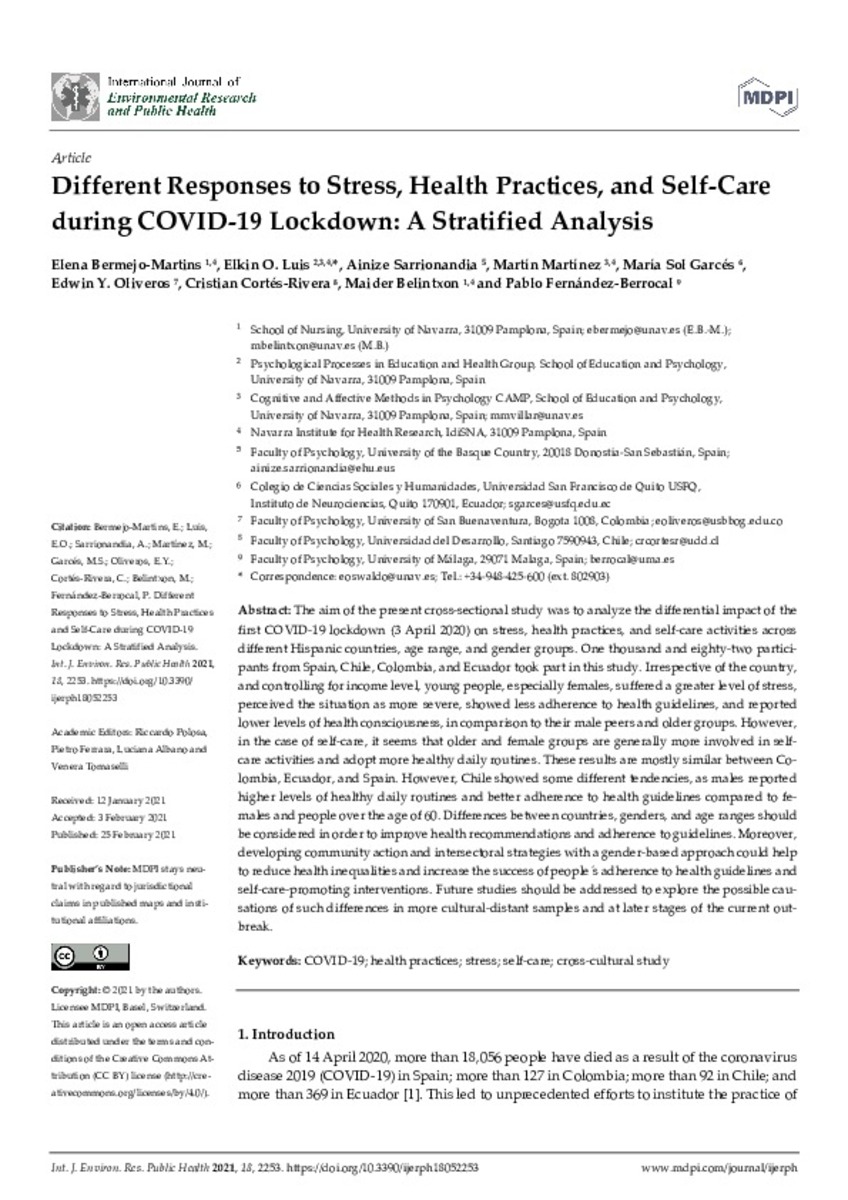Full metadata record
| DC Field | Value | Language |
|---|---|---|
| dc.creator | Bermejo-Martins, E. (Elena) | - |
| dc.creator | Luis-Garcia, E.O. (Elkin Oswaldo) | - |
| dc.creator | Sarrionandia, A. (Ainize) | - |
| dc.creator | Martinez, M. (Martín) | - |
| dc.creator | Garcés, M.S. (María Sol) | - |
| dc.creator | Yair-Oliveros, E. (Edwin) | - |
| dc.creator | Cortés-Rivera, C. (Cristian) | - |
| dc.creator | Belintxon, M. (Maider) | - |
| dc.creator | Fernández-Berrocal, P. (Pablo) | - |
| dc.date.accessioned | 2021-02-25T11:11:48Z | - |
| dc.date.available | 2021-02-25T11:11:48Z | - |
| dc.date.issued | 2021 | - |
| dc.identifier.citation | Bermejo-Martins, E. (Elena); Luis-Garcia, E.O. (Elkin Oswaldo); Sarrionandia, A. (Ainize); et al. "Different responses to stress, health practices and self-care during COVID-19. Lockdown: a stratified analysis". International Journal of Environmental Research and Public Health. 18 (5), 2021, 2253 | es |
| dc.identifier.issn | 1660-4601 | - |
| dc.identifier.uri | https://hdl.handle.net/10171/60124 | - |
| dc.description.abstract | The aim of the present cross-sectional study was to analyze the differential impact of the first COVID-19 lockdown (3rd April 2020) on stress, health practices, and self-care activities across different Hispanic countries, age range and gender groups. 1082 participants from Spain, Chile, Colombia, and Ecuador took part in this study. Irrespective of the country, and controlling for income level, young people, especially females, suffered a greater level of stress, perceived the situation as more severe, showed less adherence to health guidelines and reported lower levels of health consciousness, in comparison to their male peers and older groups. However, in the case of self-care, it seems that older and female groups are generally more involved in self-care activities and adopt more healthy daily routines. These results are mostly similar between Colombia, Ecuador, and Spain. However, Chile showed some different tendencies, as males reported higher levels of healthy daily routines and better adherence to health guidelines compared to females and people over the age of 60. Differences between countries, genders and age ranges should be considered in order to improve health recommendations and adherence to guidelines. It would also be crucial to identify vulnerable groups to promote the adoption of health behaviors that may help in the development of effective public health strategies. Future studies should be addressed to explore the possible causations of such [...] | - |
| dc.language.iso | en | - |
| dc.rights | info:eu-repo/semantics/openAccess | - |
| dc.subject | COVID-19 | - |
| dc.subject | Health practices | - |
| dc.subject | Stress | - |
| dc.subject | Self-care | - |
| dc.subject | Cross-cultural study | - |
| dc.title | Different responses to stress, health practices and self-care during COVID-19. Lockdown: a stratified analysis | - |
| dc.type | info:eu-repo/semantics/article | - |
| dc.relation.publisherversion | https://www.mdpi.com/1660-4601/18/5/2253 | - |
| dc.description.note | This is an open access article distributed under the Creative Commons Attribution License which permits unrestricted use, distribution, and reproduction in any medium, provided the original work is properly cited | - |
| dc.identifier.doi | 10.3390/ijerph18052253 | - |
| dadun.citation.number | 5 | - |
| dadun.citation.publicationName | International Journal of Environmental Research and Public Health | - |
| dadun.citation.startingPage | 2253 | - |
| dadun.citation.volume | 18 | - |
Files in This Item:
Statistics and impact
Items in Dadun are protected by copyright, with all rights reserved, unless otherwise indicated.






